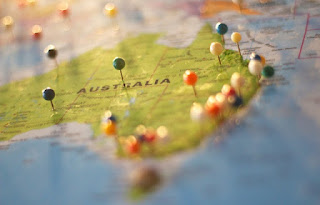There has been gross over simplification of Brexit to supposedly avoid bureaucracy, the EU, Europe and increasing antipathy towards immigration by ageing electorates through populist politicians.
However, many would suggest Australia had a form of Brexit upon colonisation via the First Fleet 1888 by the British, then after Federation in 1901 the bi-partisan 'White Australia Policy' inspired by British eugenics movement (and finally ended after mostly opposition by NGOs, churches etc.).
Fast forward to the supposed crisis of Tampa when then Australian Prime Ministers helped start the demonisation of refugees with able support from mainstream media including Murdoch's NewsCorp, then carried further by society in creating antipathy towards non-Europeans; a new proxy white Australia policy.
Further, there are clear links between ideology, political and media tactics of white nativism or white nationalism inspired by eugenics, which has been mainstreamed in the US and UK; with further links onto the fringes of Europe.
White nationalism, white nativism or eugenics all share a clear architecture including astro turfing, manipulation of media, fake news etc., that can also be linked to radical right libertarians or elements of neo-liberalism by global corporates, via think tanks, to deflect attention away from tax avoidance, interference in domestic policies, cast doubt on climate change etc.
However, many would suggest Australia had a form of Brexit upon colonisation via the First Fleet 1888 by the British, then after Federation in 1901 the bi-partisan 'White Australia Policy' inspired by British eugenics movement (and finally ended after mostly opposition by NGOs, churches etc.).
Fast forward to the supposed crisis of Tampa when then Australian Prime Ministers helped start the demonisation of refugees with able support from mainstream media including Murdoch's NewsCorp, then carried further by society in creating antipathy towards non-Europeans; a new proxy white Australia policy.
Further, there are clear links between ideology, political and media tactics of white nativism or white nationalism inspired by eugenics, which has been mainstreamed in the US and UK; with further links onto the fringes of Europe.
White nationalism, white nativism or eugenics all share a clear architecture including astro turfing, manipulation of media, fake news etc., that can also be linked to radical right libertarians or elements of neo-liberalism by global corporates, via think tanks, to deflect attention away from tax avoidance, interference in domestic policies, cast doubt on climate change etc.
 |
| Australia Ready for Anti-Immigrant Brexit? (Image copyright Pexels) |
November 5, 2019 — 12.00am
It is Canberra’s new conventional wisdom: the government’s
unexpected election victory gives Prime Minister Scott Morrison stature and
stability that his recent predecessors all lacked. The last decade of political
dysfunction is behind us. The trouble is, this view is based solely on very
recent events in one country alone. What if we took a global perspective over a
longer period?
A political transformation has been under way in Western
democracies for decades now, quietly and in the background for most of that
time, though in recent years it has broken cover. In the US it produced Donald
Trump, in the UK Brexit, and in Europe the rise of new right-wing populist
movements.
Western democracy has hollowed out. It has happened in two
stages. First, the public has drifted away from major political parties, the
institutions that once connected them to the political process. In every
Western nation, mainstream centre-right and centre-left parties are in decline.
In the early to mid-20th century, party affiliation was a question of class,
religion and family inheritance – you voted a certain way because your parents
and peers did too. But for decades now membership of the big parties has fallen
and the share of the vote they can rely on has decreased.
In response (and this is stage two), the big parties have
found new ways to survive. They have evolved from amateur mass-membership
organisations to small, professionalised outfits financially reliant on big
donors and, increasingly, the state. Other than at election time, the big
parties don’t really need the public.
So, voters withdrew from political parties, and the parties
responded with a withdrawal of their own. The result is that the public square
is left empty and politics is hollow.
In Europe, right-wing populist parties have done well
because the minority of voters who are attracted to those ideas have slipped
from the grip of the big parties. But as France’s Emmanuel Macron and Germany’s
Greens show, the big parties are not bleeding votes only to the right, they are
losing them in the centre and on the left too.
In America, the weakening of parties helped mavericks like
Trump and Bernie Sanders, who tied themselves to the big parties out of
self-interest rather than conviction.
In the UK and Australia, the decline of the big parties has
produced a different kind of instability. In both countries the voting system
makes it hard for small parties to win seats even though their vote share has
increased. Yet as the big parties have become less popular, they have also
become less stable and more vulnerable to shocks from outsiders and ambitious
MPs. That’s what caused Brexit, essentially an internal Tory Party dispute
stirred up by Eurosceptic backbenchers and Nigel Farage’s UKIP.
It is also what has produced the leadership churn in
Australian politics over the last decade, a succession of tight election
results, and two periods of minority government. Australians are abandoning the
major parties at record rates. At the same time, these shrinking and insular
parties are increasingly cut off from a bored and unengaged Australian public.
Lacking genuine connections to a deep social base,
major-party MPs look to their peer groups in politics and the media for
inspiration, which is where they got the idea that changes of leadership might
fix their problems and why, for instance, Morrison borrows Trumpian language on
"negative globalism".
The 2019 election resolved none of these underlying
problems. True, the Liberal and Labor parties have now changed their rules so
that leadership coups are harder to mount, but this is much more than just a
leadership issue.
Again, if we broaden our view beyond Australian shores, we
can see why. Angela Merkel has been German chancellor for 14 years, yet in that
period, German politics has been completely transformed – Alternative fur
Deutschland, a populist party that didn’t even exist when Merkel took office,
is now the official opposition in the Bundestag.
It would be foolish to assume that Australian politics,
still dominated by two parties the public cares little for, is suddenly immune
to upheaval on that scale.
Sam Roggeveen is director of the International Security
Program at the Lowy Institute and author of Our
Very Own Brexit: Australia’s Hollow Politics and Where It Could Lead Us.'
For more articles and blogs about white nationalism, immigration and Australian politics click through.

